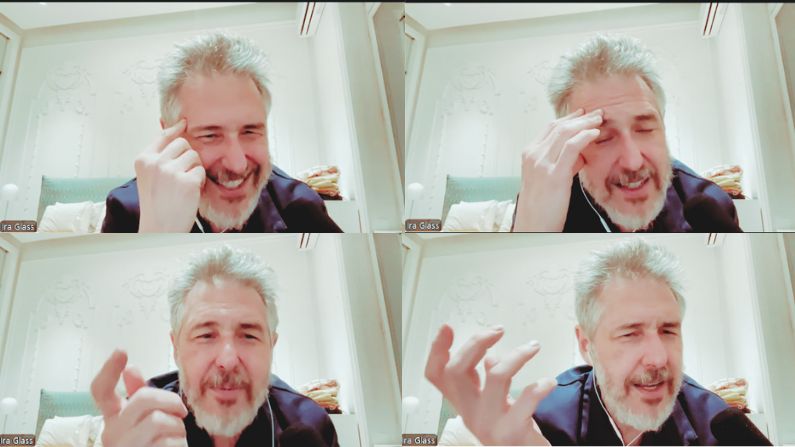In 1995, “This American Life” took to the airwaves on WBEZ radio in Chicago. The weekly show—and now also podcast—chooses a theme, and weaves together a series of stories around that theme, offering intimate glimpses into everyday lives and extraordinary circumstances. Now some 30 years later, the show has millions of listeners around the world.
In advance of tickets going on sale for his August 2 visit to the Center for the Arts, Glass spoke with KHOL about storytelling— and something unexpected he’s learned recently. Listen above for the conversation or read a transcript below.
The transcript is edited for clarity.
***
Cohen: Your show is titled “Seven Things I’ve Learned” — what is something you’ve learned recently?
Glass: Okay, so this is so personal and it’s so corny, but I just, like, fell in love with somebody in the last year and a half. And I didn’t understand that you could connect with somebody the way that I am in this relationship.
And it really makes me question a lot of things. There’s a lot of very corny things that people say will happen if you’re in love. Like I understand that now and I think, oh that’s real. I don’t think I understood that everything that people say about…oh, well, you can just kind of understand each other without explaining. I don’t think I had experienced that in a relationship.
I always was involved with people who were so different from me, because it seemed so interesting. My mom was a marriage therapist and counseled couples. And so there was this idea growing up — nothing’s perfect, like no relationship is perfect. And so, like, if there’s trouble and if it’s hard connecting to the other person, that’s normal. And if you’re an adult, you’re just like, okay, so this is about as good as it gets. And I think that mentality kept me from understanding, like, oh no, no, I could I could be in a relationship that’s so much better than this.
Cohen: What do you think enabled that at this stage? Was it the other experiences or is it just luck?
Glass: I think it was dumb luck. But also I have to say, like when I was younger, when I was married, I think I was a less mature person and I was less…I think I understood myself less well, which made me a worse partner.
Cohen: I appreciate you sharing that and I’m happy for you. That’s an amazing feeling.
–
How do you decide what goes on the air? Like you must get pitches all the time. Can you talk through the life cycle and elements of a story that you decide to broadcast?
Glass: It is a really disturbingly random process where, a lot of the secret of our show being good is that we run out a lot of stuff and then we kill a lot of stuff that doesn’t work. And so it’s for us to find stuff to go on the air, it’s a mix. We’ll decide…oh, let’s do something about all these federal workers who are losing their jobs, but look for something that you haven’t heard everywhere else. But then but then often, like, like a lot of the best stories will just be like the, you know, we stumble upon some story, we see some clipping in some not big newspaper, or we see a clipping in a big newspaper that like, we’re just like, oh, there’s this one little corner of it that we could do or, or like somebody knows somebody who hears about a story and they tell us. Because the stories in our show are so small and personal, like a certain percentage of the stories really do come from just like somebody knows somebody, know somebody.
Cohen: Is there any risk that you’ve taken with your approach to storytelling that has paid off?
Glass: We try weird stuff all the time. You know what I mean? Like, I mean, even there’s a show that we did in mid-February just a couple of weeks ago, which is this guy Zach Mack, and his dad is very conservative, believes a lot of conspiracy theories. Zach is a reporter and is a more fact-based person. And they constantly were getting into these arguments —friendly, loving arguments, but real arguments. And finally, his dad suggested at the beginning of 2024, to make a bet for $10,000 about what’s going to happen this year. And so Zach took the bet, and his dad made all these predictions based on his conspiracy theories. And when the thing began, we didn’t know how it was going to play out. We don’t know the end of the story. We had to wait a year. So I feel like we get into all sorts of situations like that where we really don’t know what’s going to happen, but we just start recording like and crossing our fingers and just like hoping for something.
Cohen: How did you make this transition from NPR, reporting news—”All Things Considered”—to a show that’s about our personal feelings, but also about the news?
Glass: I’ve thought about this. It’s funny because I just put a thing into the speech about this, because I was just like a normal production assistant at All Things Considered in my early 20s. Like, I started at NPR when I was a teenager. I was still in college and my mom used to take us to a lot of Broadway musicals. We wouldn’t go to New York, but like, they would do touring companies tour around the country. So I grew up in Baltimore and so touring companies would come through and I would see these shows and they really always got to me—those old-fashioned…like “Fiddler on the Roof” and “Cabaret.” They start off as comedies and then they get really big and sad and epic about something big and important. When I was working at “All Things Considered” and “Morning Edition,” I always had this feeling of like, oh, this story could have more feeling like we could push this further, we could push this further.
I kept trying to just make stories that would have more of the feelings that I remembered from going to those old-fashioned shows. And it just led me to a series of conclusions about how to make personal stories and then how to make them have that feeling of like where they would start kind of funny, and they would get kind of sad and just like, use some of the tools in the bag of tools you use, if you’re doing that kind of story, rather than if you’re doing the kind of stories I was doing when I was a production assistant.
Cohen: One of the quotes that probably resonates most with so many people that you’ve said is that when you first start making something, your taste is further along than your skill—
Glass: For anybody who wants to do some sort of creative work it’s really normal that you just realize, like, oh, I’m bad…like I’m not good at all. And then that’s where a lot of people quit. But you have to turn that attitude…You can basically just decide it is normal to be bad. And what I’m going to do is—I’m just going to make something…I’m going to make something else…I’m going to make something else. And I’m just going to try to learn from each one. I’m going to put myself under a deadline. And that’s actually the only way out of it. I myself was like really bad. Like, I was bad for most of my 20s.
At least somebody’s trying to make stories out of nothing. And I really just experimented and tried to, like, take the experiments to heart.






